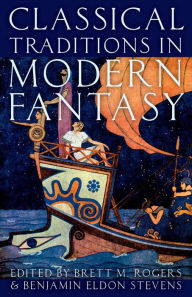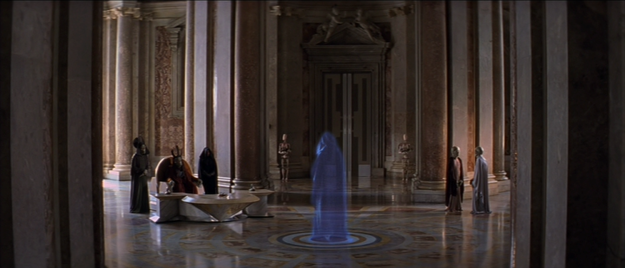 (Yes, I know it’s now January.)
(Yes, I know it’s now January.)
Hi there. This blog has been quiet most of 2016, but I hope to make it a bit more regular in 2017. Here then is a collection of relevant publications, posts and conferences from the end of 2016.
Brett Rogers and Ben Stevens’ follow-up to Classical Traditions in Science Fiction, Classical Traditions in Modern Fantasy, is now out from Oxford University Press. Those with a Nook can get the ebook discounted from Barnes and Noble. Brett and Ben have been honoured by the SCS for their work on Classics and sf.
Our Mythical Childhood… The Classics and Literature for Children and Young Adults includes chapters on J.M. Barrie and J.K. Rowling, and much other material that speaks to our interests, particularly where modern Young Adult fantasy is concerned. This is part of a larger project, Our Mythical Childhood, where you can find more relevant material.
There’s a new edition of Adam Roberts’ History of Science Fiction out, with its opening chapter in ‘SF and the Ancient Novel’ (which can be purchased separately, though at more than the cost of the whole ebook!).
Richard A. Spencer’s Harry Potter and the Classical World: Greek and Roman Allusions in J.K. Rowling’s Modern Epic came out in 2015. Katherine McDonald reviewed it for Classics For All in November.
Journal of Hebrew Scriptures has a special issue on Science Fiction and the Bible.
 Just before Rogue One appeared, Vince Tomasso wrote about the use of Rome in Star Wars, making interesting points about the interrelationship between ideas of America, Rome and the Galactic Empire, ideas complicated now by Rogue One‘s clear drawing of parallels between Imperial forces and the US Army in Iraq. I agree with Vince that the First Order plot in The Force Awakens is a bit arbitrary (or, to put it another way, ‘nonsense’) – it’s all handwaving so that J.J. Abrams can restore the Empire vs. Rebels dynamic of Episodes IV-VI. It’s also very clear, as Peter Bondanella and Martin Winkler both saw a long time ago, that Lucas’ vision of Rome is heavily filtered through the movies of the 1950s and 1960s. The arch at the end of Episode I looks Roman because (as many reading this probably know) the whole victory parade through Naboo is a virtual shot-for-shot copy of the triumphal procession of Commodus into Rome in Anthony Mann’s 1964 epic Fall of the Roman Empire. Vince’s blog, Reboot the Past, regularly features articles on sf/fantasy and Greece and Rome. Rogue One itself has the usual references to the Senate, but perhaps less on America-as-Rome than previous movies.
Just before Rogue One appeared, Vince Tomasso wrote about the use of Rome in Star Wars, making interesting points about the interrelationship between ideas of America, Rome and the Galactic Empire, ideas complicated now by Rogue One‘s clear drawing of parallels between Imperial forces and the US Army in Iraq. I agree with Vince that the First Order plot in The Force Awakens is a bit arbitrary (or, to put it another way, ‘nonsense’) – it’s all handwaving so that J.J. Abrams can restore the Empire vs. Rebels dynamic of Episodes IV-VI. It’s also very clear, as Peter Bondanella and Martin Winkler both saw a long time ago, that Lucas’ vision of Rome is heavily filtered through the movies of the 1950s and 1960s. The arch at the end of Episode I looks Roman because (as many reading this probably know) the whole victory parade through Naboo is a virtual shot-for-shot copy of the triumphal procession of Commodus into Rome in Anthony Mann’s 1964 epic Fall of the Roman Empire. Vince’s blog, Reboot the Past, regularly features articles on sf/fantasy and Greece and Rome. Rogue One itself has the usual references to the Senate, but perhaps less on America-as-Rome than previous movies.
Also in the run-up to Rogue One, Smithsonian.com ran an article on Lucian’s True Histories.
Curtis Whitacre writes about Dionysus (in particular) in The Wicked + The Divine.
One of the things I (Tony) have been involved in this year is The Slings and Arrows Graphic Novel Guide. It’s an ever-growing site, by no means comprehensive as yet. But there’s plenty there relevant to our interests. I can’t possibly cover everything here, but they include: various Asterix volumes; The Wicked + The Divine; Kieron Gillen’s Three; Atlas’ Venus; Greek Love; Eddie Campbell’s Bacchus; various titles featuring Hercules; Marvel Illustrated’s The Odyssey; Democracy; and, of course, loads of Wonder Woman.
The website Legonium: Where Latin Meets Lego includes quite a lot of stuff with sf or fantasy themes. Pretty amusing as well.
Now, some conference news:
Booking opens on 17 January for the 2017 Classical Association Conference, which this year takes place from 26-29 April in Canterbury, jointly convened by the Open University and the University of Kent. Looking at the conference programme, there are several sessions relevant to our interests. On Thursday morning there are sessions on ‘Star Wars and Classical Reception’ (this one is convened by me), and ‘Classical Fantasy and Fiction’, and a paper on ‘Livy’s Syracuse as a model for an alternate-reality Rome’ (which unfortunately clashes with the Star Wars panel). On Friday there’s a session on ‘Ancient Attitudes Towards the Oceanic Uncanny’, and a paper on ‘Magic, materiality and the senses in Roman Britain’. And on Saturday afternoon there’s a session on ‘Modern Amazons on Page, Stage and Screen’, with lots of Wonder Woman content.
‘Transnational Monstrosity in Popular Culture’ is taking place at York St John University on 3 June. Plenty of scope there for Classical monsters. The CFP closes on 1 March, and you can follow news about the conference on their Twitter account, @TNMonstrosity.
The Hercules Project is holding a conference, ‘Celebrating Hercules in the Modern World’, at Leeds on 7 July. The CFP closes on 31 January.
Very close to out interests is ‘Reception Histories of the Future: a conference on Byzantinisms, speculative fiction, and the literary heritage of medieval empire’, which takes place in Uppsala, Sweden, over 4-6 August, a week before Worldcon 75 in Helsinki. Unfortunately, a commitment to another event keeps me away. Call for Papers, for panel ideas and other offers of participation closes on 28 February.
The journal New Directions in Folklore has a Call for Papers for an issue on The Folk Awakens: Star Wars and Folkloristics in Popular Culture. CFP closes on 31 January.
On 12 January, Verso Books are hosting an event in Somerset House on Thomas More’s Latin work of science fiction, Utopia: ‘Imagining the Perfect World: Utopias in Cities and Fiction’.
Speaking of Wonder Woman, as we were a bit ago, we’ve seen the trailer for the 2017 movie in the cinema a few times in the past few weeks. Looking forward to this.
A last little thing – I was watching a documentary on Charlton Heston, for the obvious stuff (and noting how much of the fantastic there is in The Ten Commandments and – to a lesser extent – Ben-Hur), and noticed that in his 1971 sf movie The Omega Man, in Heston’s home there is a bust of the Emperor Caracalla. Read into that what you will.
Thanks to Ben Stevens, Alex Middleton, Vince Tomasso and others for bringing all of this to my attention. If anyone has noticed anything else related to sf and the Classics, please leave a comment here or e-mail me at a.g.keen@open.ac.uk, and I’ll include it in a future mailing.